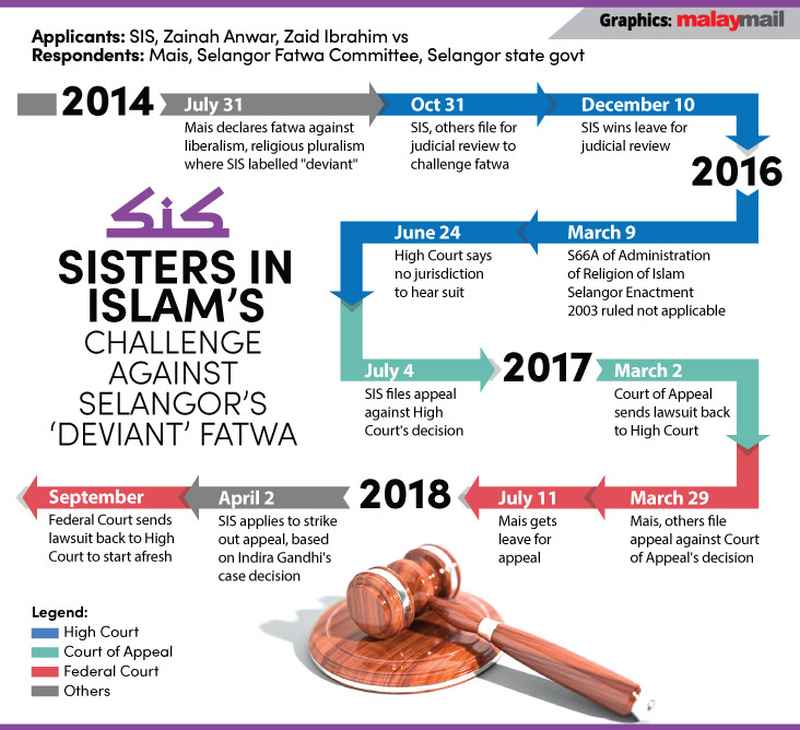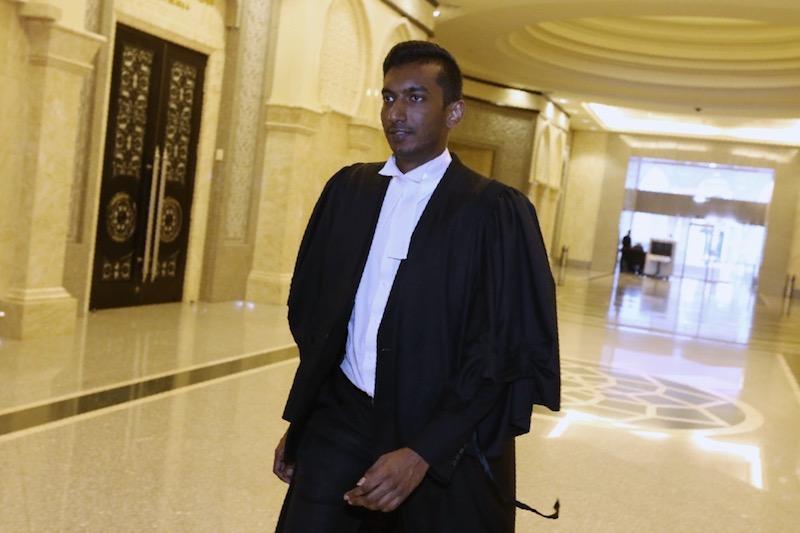KUALA LUMPUR, May 2 ― The High Court will today hear Sisters in Islam’s (SIS) challenge against a fatwa, or religious edict, declaring it “deviant” ― three years after it dismissed the Muslim women’s rights group’s initial judicial review in 2016.
The Federal Court had decided in favour of SIS last year, sending the lawsuit back to the High Court for SIS to challenge the fatwa by the Selangor Islamic Religious Council (Mais) against any persons or groups “professing liberalism or religious pluralism”.
“SIS’s challenge is mounted on the basis that the fatwa violates certain provisions in the Federal Constitution, certain federal laws and the Selangor administration of Islamic law enactment itself,” SIS’s lawyer A. Surendra Ananth told Malay Mail.
The judicial review application was first filed on October 31, 2014 by three applicants ― the company SIS Forum (Malaysia) Bhd which operates SIS; the group’s co-founder Zainah Anwar; and Datuk Zaid Ibrahim, with the three respondents named as the Selangor Fatwa Committee, Mais, and the Selangor state government.
The fatwa, gazetted on July 31, 2014, had singled out SIS by name, in addition to “any individuals, organisations or institutions” deemed “liberal”.
It also deemed any publication with elements of liberalism and religious pluralism as “haram”, or prohibited, and liable for seizure by religious authorities.
In addition, the fatwa had urged local Internet regulator Malaysian Commission of Multimedia and Communications to block “any social websites” opposed to Islamic teachings and laws.
Fatwas are opinions issued by Islamic clerics on a multitude of issues. Although these are advisory in nature, Malaysia occasionally gazettes some into law.
However, SIS’s challenge against the fatwa in 2014 had antagonised Islamists, drawing rebuke and protests such as PAS Youth then declaring SIS as an “insolent” and “extremist” group out to challenge the monarchy and Federal Constitution.
In addition, SIS was also recently attacked by PAS after receiving RM20,000 contribution from deputy minister Hannah Yeoh to fund its Telenisa free legal advisory service.
The group’s lawyer Datuk Malik Imtiaz Sarwar had, however, clarified last year that the lawsuit by SIS was not regarding Islamic law, but merely on whether the fatwa issued against it was done legally and according to proper procedures.
Malik said SIS was not implying that the fatwa was wrong in Islamic law, but that it had gone beyond the legal limits and infringes on fundamental freedoms.
 A five-year journey
A five-year journey
SIS will argue today among others that religious authorities have no jurisdiction over companies like SIS, as they only have jurisdiction in respect of persons professing the religion of Islam.
It will also argue that the fatwa is an unlawful fetter on SIS’s freedom of expression.
“The fatwa does not define what amounts to ‘liberalism and pluralism’. Further, disobeying a fatwa is a criminal offence,” Surendra said.
“Liberalism” encompasses a wide array of ideas, but its proponents commonly espouse notions such as civil rights, freedom of speech and of religion, free trade, private property, and free and fair elections.
Meanwhile, “religious pluralism” maintains that no one religion holds the sole and exclusive source of truth, often promoting harmonious co-existence and understanding between all faiths and their adherents.
Malaysia’s religious authorities under the previous administration had derided liberalism and pluralism, with Friday sermons nationwide claiming a conspiracy by “enemies of Islam” to manipulate Muslims through ideas like secularism, socialism, feminism and positivism, in addition to the two.
On December 2014, then High Court judge Datuk Asmabi Mohamad had granted SIS leave for the judicial review to be heard on its merits.
But High Court judge Datuk Hanipah Farikullah had on June 24, 2016 dismissed the case based on a preliminary objection by the Selangor religious authorities on the issue of which court had jurisdiction, ruling that only the Shariah courts have the powers to deal with the fatwa.
This led to SIS appealing successfully to the Court of Appeal to reinstate the lawsuit and for it to be sent back to the High Court to be heard before another judge. The Selangor religious authorities later filed its appeal, and had on July 11, 2017 obtained leave from the Federal Court to proceed.
Consequently, a seven-man panel at the Federal Court led by the then Chief Justice Tan Sri Richard Malanjum had on September last year directed the High Court to start the case afresh and decide on all issues raised by the parties.



















